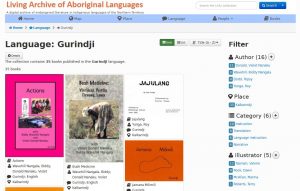The Living Archive project has a number of items digitised but not yet available on our website. This is usually because we haven’t yet found the named creators of the material, to ask their permission to include them. While we already have permission from the copyright holders (usually the NT Department of Education or another organisation), the project team wants to go beyond this and make sure that the creators are happy for their materials to be available on our open access website under the Creative Commons license.
It has been difficult to find people, especially in communities that didn’t have bilingual education programs, where we don’t have such strong connections, so we often rely on local people or regular visitors to these communities to help us get permission forms signed.
Working with local linguist, Erika Charola, we’ve been working to find a process that would be suitable for the community at Kalkarindji/Daguragu so that we could make public a collection of Gurindji materials. Our project manager had the privilege of visiting the community last year during Freedom Day 2016, the 50th anniversary of the Wave Hill walkoff, but with all the celebrations that weekend it wasn’t appropriate to find people to sign forms. We printed copies of the digitised materials we had, and sent them to Erika at Kalkarindji school to show around and ask people what they thought about having these materials on the Internet.
One of the local language workers went around and found some of the people and got their permission, but it was very time consuming. Erika had the idea to have all the printed books at the Arts Centre and invite people to come and have a look, and have permission forms there for people to sign. She posted this on their Facebook account:
In the leadup to Freedom Day this year, we got permission for a number of books to go ‘public’ on the Living Archive website. You can see these books here, and we hope more will become available soon.
Getting permission for materials is one of the most challenging parts of growing the Living Archive, so we really appreciate the help we get from people in community. If you’d like to help us make more materials available, and you have connections in some remote NT communities, contact us to find out more about how you can be involved.

